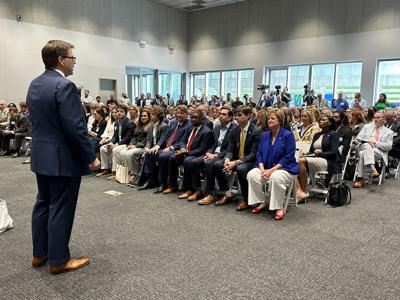Five of Louisiana’s candidates for governor made their pitch Wednesday to the state’s oil and gas industry, largely promising to make it easier for oil and gas companies to land lucrative tax breaks, resolve coastal lawsuits and invest in drilling and clean energy.
The forum, hosted by a coalition of Louisiana’s biggest and most influential industry groups, gave the candidates an opportunity to promote themselves to some of the most important campaign donors in Louisiana politics. The Grow Louisiana Coalition hosted the event alongside the Louisiana Oil and Gas Association, Louisiana Chemical Association and others.
It came as the candidates are starting to launch TV ads to introduce themselves to voters and set themselves apart in a crowded field to replace Gov. John Bel Edwards, a Democrat who is term limited.
Louisiana Mid-Continent Oil and Gas Association President Tommy Faucheux, who moderated the panel, called coastal lawsuits a “get-rich-quick” scheme and dismissed Edwards’ changes to the Industrial Tax Exemption Program as “anti-business” as he posed questions to the candidates. Attorney General Jeff Landry and Treasurer John Schroder, both Republicans, skipped the event.
The candidates all broadly said that they support oil and gas extraction alongside renewables. Louisiana has long relied heavily on its petrochemical industry, but companies and the federal government are increasingly seeking to limit emissions causing climate change. Still, industry groups and Republican leaders have insisted Louisiana must continue to invest in its oil and gas industry to create economic opportunities.
The candidates differed some on how and whether to approach transitioning to clean energy, as Louisiana sits at the epicenter of the effects of climate change, including sea level rise and more intense storms. The Intergovernmental Panel on Climate Change recently said that the world needs “deep, rapid and sustained” reductions in greenhouse gas emissions to limit warming to 1.5 degrees celsius above pre-industrial levels. Human activity has already driven global warming of 1.1 degrees celsius.
Several candidates were non-committal about whether to continue Edwards’ pursuit of net-zero carbon emissions by 2050, which he’s done through a climate task force that made Louisiana the only Deep South state with such a climate plan.
State Sen. Sharon Hewitt, a former Shell Oil engineer and executive from Slidell, took a shot at Landry over coastal lawsuits, calling him “Lawsuit Landry” for signing onto a landmark settlement in one such major lawsuit. She vowed to “pause” coastal lawsuits and research which companies violated permits.
In an interview, she didn’t say whether she’d continue the state’s plan for net-zero carbon emissions by 2050, calling the goal good and “aspirational” but saying “fossil fuels are not going away anytime soon.”
State Rep. Richard Nelson, a 36-year-old Mandeville engineer and attorney who formerly worked in the foreign service, said he would continue the state’s climate action goals but also promote petrochemical production in Louisiana instead of overseas. He said Louisiana has long used oil and gas extraction as a “crutch for bad policy” and that it should instead be used as a “competitive advantage” as it evolves to become cleaner.
He said he’d address the coastal lawsuits and ITEP issues making sweeping changes to Louisiana’s tax and legal structure, modeling it after Texas and other states that have seen population gains. He called ITEP a “band aid on bad tax policy that’s been around for 100 years.”
Stephen Waguespack, the Republican former head of the Louisiana Association of Business and Industry, blamed the Biden administration for standing in the way of more oil and gas development in Louisiana, and slammed the state’s coastal lawsuits. ITEP under his term would also be revamped to eliminate the vote of local governments, which he said has created a “question mark” around the state.
He was also non-committal on whether he would support getting to net-zero by 2050, but said the oil and gas industry is changing dramatically and that he supports carbon capture and sequestration.
Shawn Wilson, the only major Democrat running and the former secretary of the Department of Transportation and Development, said he wants to work closely with industry as the state pursues its climate action goals. He touted the administration’s work developing new hydrogen technologies through a partnership with other states, and said the state should tap into its oil and gas expertise to grow the energy industry.
Wilson noted oil and gas companies are increasingly investing in wind and carbon capture, which he supports, and said Louisiana stands to gain as the energy industry becomes cleaner.
Meanwhile, Hunter Lundy, a Lake Charles attorney who is politically independent, at times appeared to question the science of climate change, wondering aloud whether it is a “truthful movement or not.” Still, he said supports taking advantage of federal money for clean energy while it’s around. He said in an interview he supports reducing emissions, but that some plans are too “extreme” and that a net zero carbon goal by 2050 is “not going to happen.”
Lundy, a plaintiff's attorney, blamed former Gov. Bobby Jindal and his executive counsel Waguespack for the coastal lawsuits, saying they didn’t do a good enough job enforcing penalties on oil companies.

